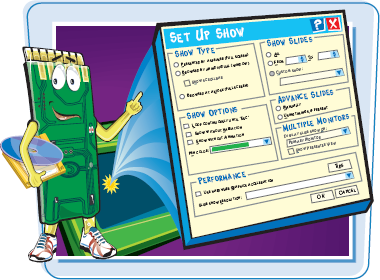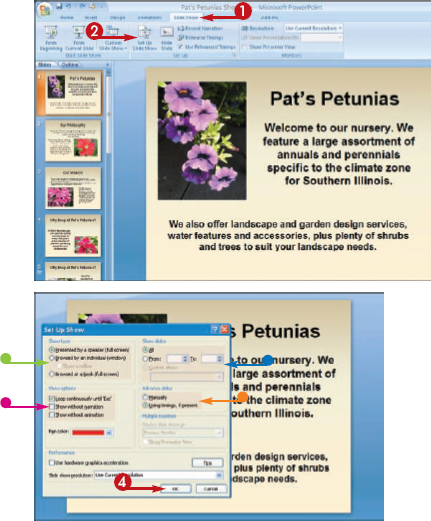You can add more slides to a presentation, or you can remove slides that you no longer want. PowerPoint makes it easy to insert new slides and delete existing slides by using buttons on the Ribbon's Home tab. You can add and remove slides on the Slides tab in Normal view, or you can switch to Slide Sorter view and manage your presentation's slides.
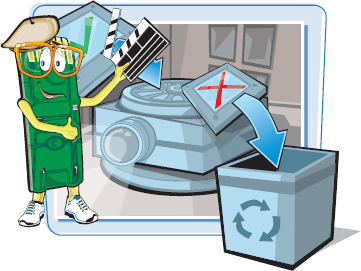
Insert and Delete Slides
INSERT A SLIDE IN SLIDE SORTER VIEW
Note
See Chapter 14 to learn how to work with PowerPoint views.
Note
See Chapter 15 to learn how to work with slide content.
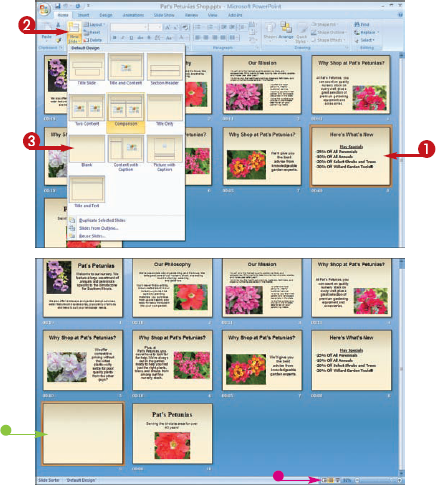
DELETE A SLIDE IN SLIDE SORTER VIEW
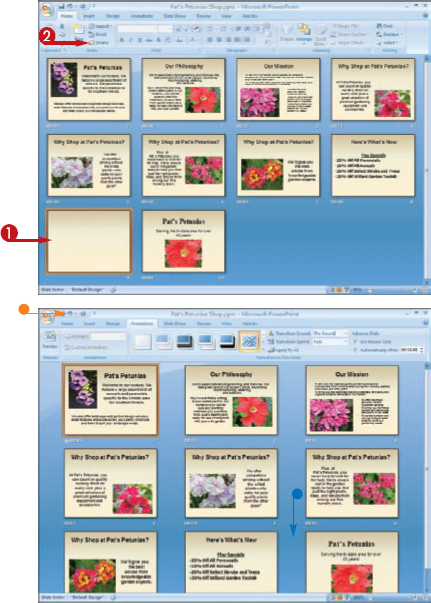
Note
How do I add and remove slides in Normal view?
In Normal view, you can quickly add slides using the Slides tab. Simply click where you want to insert a new slide in the Slides tab, and then click the Add Slide button on the Ribbon's Home tab. Select a slide layout from the menu; PowerPoint immediately adds the new slide to the presentation. See Chapter 15 to learn more about slide layouts. To remove a slide in the Slides tab, click the slide and click the Delete button or press

Can I add slides from another presentation?
Yes. Click where you want the new slides to appear in Slide Sorter view, click the Add Slide button on the Home or Insert tab, and then click Slides from Outline. Use the Insert Outline dialog box to navigate to the folder containing the presentation, and select the file that you want to insert. You may need to change the Files of Type setting to All to view other PowerPoint presentation files in the dialog box.

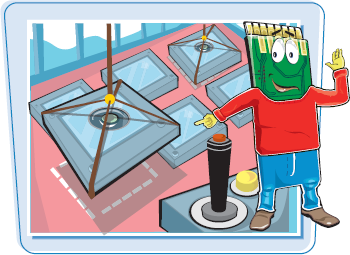
You can reorganize the order of your slides to make changes to the presentation. For example, you may want to move a slide to appear later in the presentation, or swap the placement of two side-by-side slides. PowerPoint makes it easy to change the slide order in Slide Sorter view or by using the Slides tab in Normal view.
Reorganize Slides
MOVE SLIDES IN SLIDE SORTER VIEW
Note
See Chapter 14 to learn how to work with PowerPoint views.
The
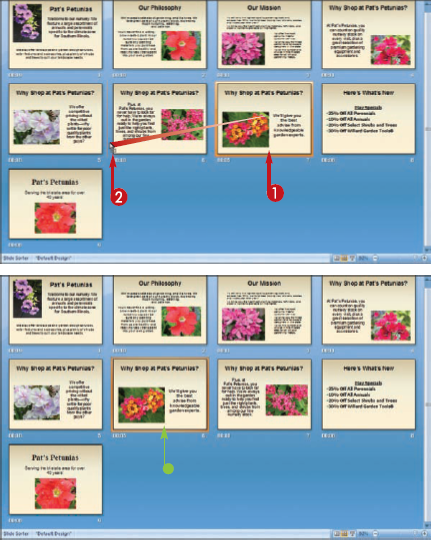
MOVE SLIDES IN NORMAL VIEW
Note
See Chapter 14 to learn howto work with PowerPoint views.
The
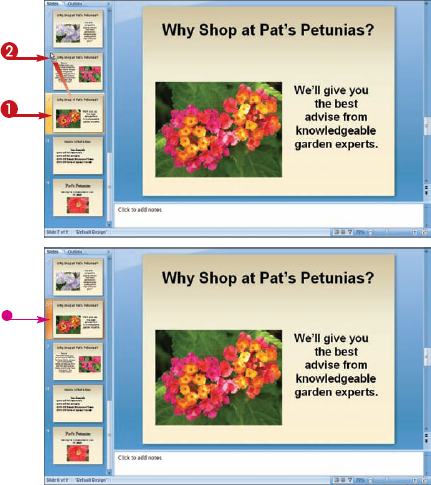
Note
How do I hide a slide in my presentation?
If you want to hide a particular slide before giving your presentation, you can activate the Hide Slide feature. Click the slide that you want to hide in Slide Sorter view, and then click the Slide Show tab on the Ribbon. Click the Hide Slide button on the Slide Show tab. PowerPoint hides the slide during the actual presentation, but keeps the slide displayed in Slide Sorter view. To unhide the slide again, repeat the steps. You can always tell when a slide is hidden if the Hide Slide button appears activated when you select the slide in Slide Sorter view.

Can I move multiple slides at once to reorganize my presentation?
Yes. To move multiple slides at the same time, press and hold

Use good judgment when assigning transitions. If you use too many different types of transitions, you may end up distracting from your presentation.
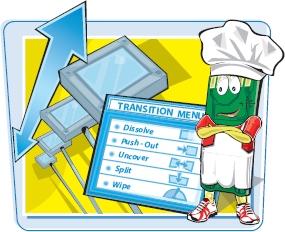
You can add transition effects to your slides to control how one slide segues to the next. Transition effects include fades, dissolves, and wipes. You can control the speed of the transition to appear fast or slow. You can also specify how PowerPoint advances the slides, either manually or automatically.
Define Slide Transitions
Note
You can also use Normal view to assign transitions; however, you may find it easier to assign effects to your entire presentation in Slide Sorter view. See Chapter 14 to learn about PowerPoint views
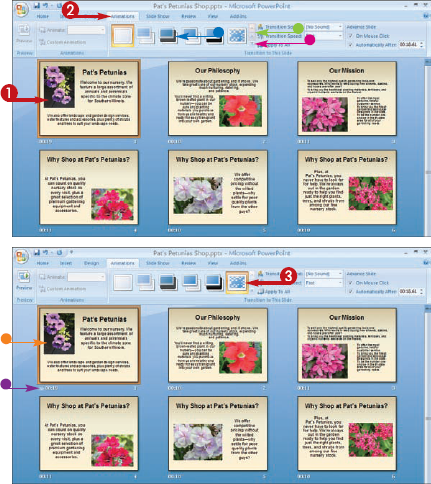
To use a mouse click to move to the next slide, click the On Mouse Click option (
To move to the next slide automatically, click the Automatically After option (
Note
See Chapter 17 to learn howto run the slide show.
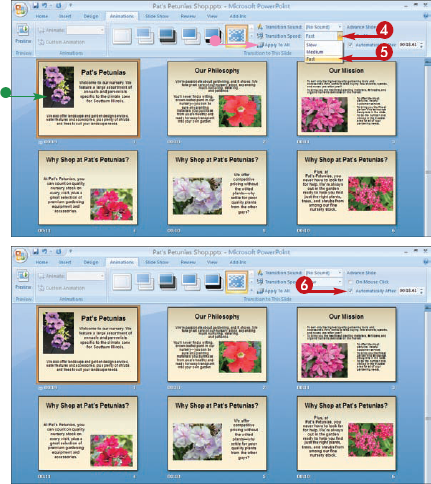
Note
How do I remove a transition effect?
To remove a transition effect, first select the slide containing the transition that you want to remove in Slide Sorter view. Click the Animations tab, and then click the No Transition option in theTransitions list box. PowerPoint removes the previous transition that you assigned to the slide and returns the slide to the default state.

What does the sound option do?
You can assign sounds as transition effects with your slides. For example, you might assign the Applause sound effect for the first or last slide in a presentation. To assign a sound transition, click the Transition Sound

should avoid assigning too many animation effects or you may overwhelm the audience. For best results, limit the effects to slides in which they make the most impact.
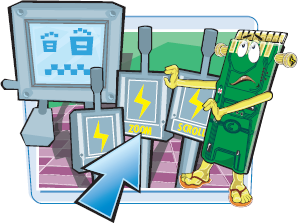
You can use PowerPoint's animation effects to add even more visual interest to your slide show presentations. You can add a simple animation effect ' such as a fade, wipe, or fly in ' to any slide element, including text boxes, clip art, and other objects. You can alsoassign a custom animation. PowerPoint's custom animation schemes include a variety of preset animations, such as spinning, zooming, and scrolling credits.
Add Animation Effects
ADD A SIMPLE ANIMATION EFFECT
Note
See Chapter 14 to learn how to work with PowerPoint views.
You can assign an animation to any object on a slide, including text boxes, shapes, and pictures.
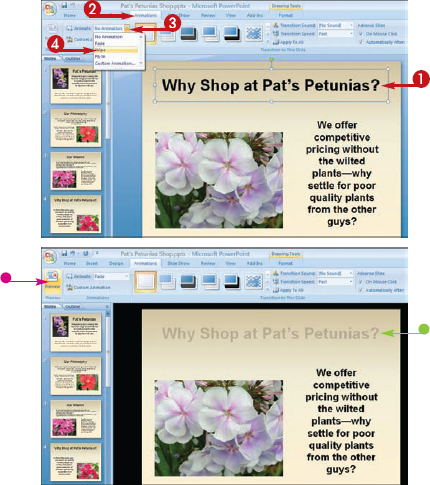
ADD A CUSTOM EFFECT
You can assign an animation to any object on a slide, including text boxes, shapes, and pictures.
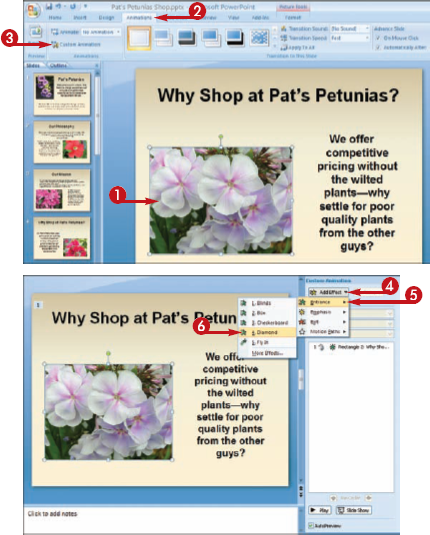
The Custom Animation task pane opens
PowerPoint immediately assigns the animation and previews the effect.
Note
How do I remove an animation effect?
To remove a simple animation effect, first select the slide element containing the effect that you want to remove. Click the Animations tab, click the Animate
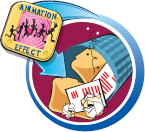
Can I edit an individual animation effect?
Yes. If you use the Custom Animation task pane to add an animation effect, you can customize how the effect appears in the slide. For example, if you assign a wipe effect, you can specify a direction for the wipe effect to appear for the element, and control the speed of the wipe effect. You can also use the Custom Animation task pane to specify whether the animation starts automatically or with a mouse click.

You can insert media clips onto your PowerPoint slides to play during a slide show presentation. For example, when creating a presentation showcasing the latest company product, you might place a video clip of the department head discussing the new item, or insert a voice clip from the designer describing the product's features. You can also insert music clips from audio CDs to play as background sound in a show.

Insert a Media Clip
If you click the Movie or Sound
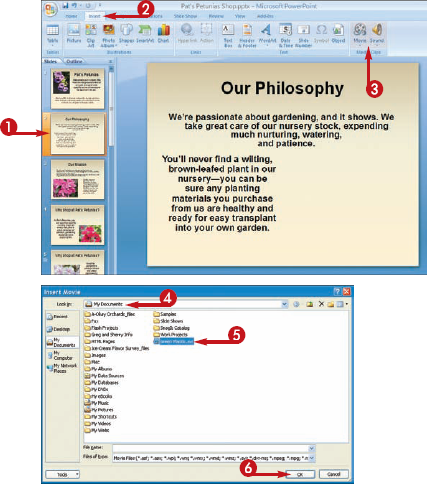
The Insert Movie or Insert Sound dialog box appears
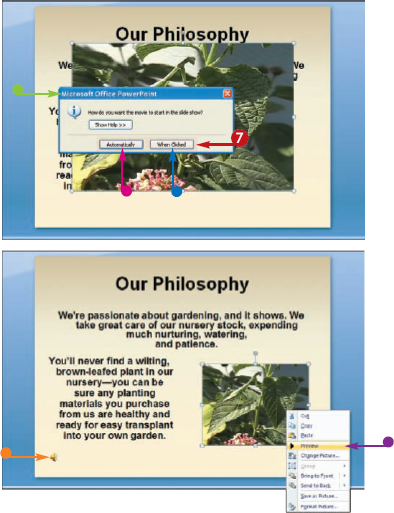
PowerPoint inserts the clip into the slide.
Note
Can I add an action button to a slide?
Yes. You can turn any shape you draw on a slide into an action button that, when clicked, jumps to a designated slide, opens a program, or runs a macro. To turn a shape into an action button, follow these steps:
The Action Settings dialog box appears.
PowerPoint assigns the action to the button.
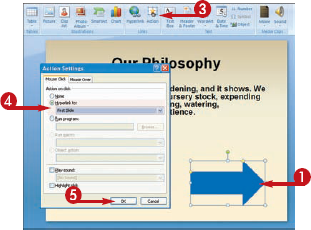
If your presentation needs some narration, you can use PowerPoint's Record Narration feature to record a narration track to go along with the show. If your computer has a microphone, you can record a narration, and save it along with the file.

Record Narration
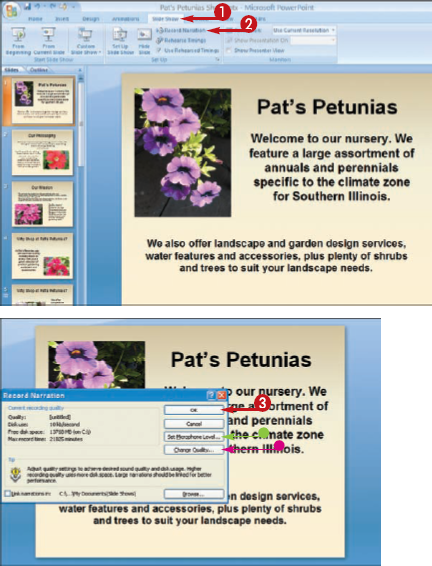
The Record Narration dialog box appears.
PowerPoint starts the show, and you can begin talking into the computer's microphone to record your narration.
Note
When you finish recording, an audio icon appears at the bottom of each slide to which you have assigned narration.

